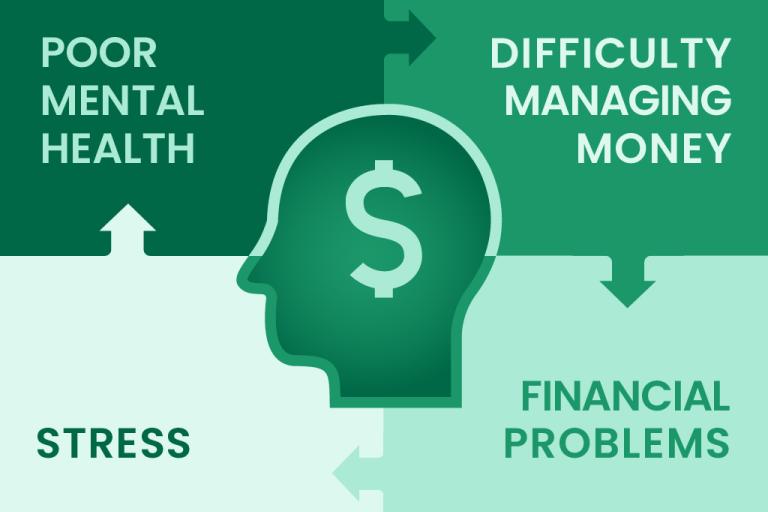On this page
What's next
Earn a high-yield savings rate with JG Wentworth Debt Relief
Experts agree that financial stress and poor mental health are inextricably linked to each other. In fact, one study found that people with a mental disorder like depression or anxiety were over three times more likely to be in debt than people without a mental disorder.
Poor mental health and financial difficulties can cycle into each other, with financial stress affecting your mentality, and mental illness contributing to financial difficulty.
If you’re struggling with your mental health, it’s likely that you’re also having difficulty tending to your finances and making sound choices with your money. And if you’re in debt, fending off collection calls and watching your interest grow higher, you’re likely to be experiencing higher amounts of stress, which can severely affect your overall mental wellbeing.

Taking care of your mental health is taking care of your financial health, and vice versa. Here are some actionable tips for breaking the seemingly never-ending cycle of financial difficulty and mental health issues.*
Tip 1: Take stock of your finances

You can only tackle your financial issues if you know exactly what you’re dealing with. Doing a total self-audit of your finances will help you gain a more holistic view of your overall money situation, which will help you decide what steps to take to improve it.
Start by adding up every source of income you have. If you have a job, calculate your monthly net pay (your payment after taxes) by looking at your paychecks. Be sure to include any government benefits, alimony, annuity payments, child support, and any other regular payments you receive. If your income fluctuates monthly, calculate your lowest expected monthly income amount.
Then look at all your monthly bills that remain at a fixed rate. This could be your car payment, your rent, your Wi-Fi bill, your subscriptions—anything that you pay the same amount for each month.
Next, calculate your debts. List every account you owe money on, and be sure to review the minimum monthly payment amounts and interest rates on each account. Check out our helpful Debt Repayment Calculator tool to see how long you can expect to be paying off your debt making the minimum monthly payments.
Finally, review your monthly spending. There are several free apps that can help you track your spending by category. If you’re struggling to make ends meet every month, figuring out exactly where your money is going is the most important step toward getting your finances back in shape.
Tip 2: Make self-care a priority

When you think of self-care, you may initially think of things like treating yourself to a spa day, taking a big vacation, or going on a shopping spree—but doing any of those things can make an already precarious financial situation worse. That’s why it’s helpful to mentally reframe self-care as little things that you can incorporate into your daily routine.
The National Institute of Mental Health defines self-care as “taking the time to do things that help you live well and improve both your physical health and mental health.” When you make self-care practices a part of your everyday life, you have an emotional center to return to every time you begin to experience stress.
Acts of self-care that are easy to add into your routine might include:
- Regular exercise. Exercise has been shown to reduce levels of stress hormones like cortisol and adrenaline and increase production of endorphins, which are the body’s natural mood elevators.
- Starting a hobby. Hobbies allow you to focus on something you enjoy instead of expending energy on entertaining negative thoughts.
- Writing down your thoughts. Keeping a journal is a great way to untangle a jumble of emotions, prioritize your problems, and identify negative patterns in your thoughts and behavior.
- Make regular plans with friends and/or family. Setting up a regular time to see your loved ones can introduce stability into your routine and give you something to look forward to.
Tip 3: Make a budget – and forgive yourself if you mess up
Okay, this might be an obvious one. But there’s a reason why people who find a way to budget their money wisely tend to be more successful in getting their finances under control!
You may have heard of different budgeting strategies like the 50/30/20 method, the “one number” budget, or the envelope budget. Each has its pros and cons, and you may have different levels of success with each one. Do some research on the different strategies online, at your local library, or just by asking your friends how they budget themselves. There are countless free resources out there built to help you keep track of your monthly spending.
There are lots of tools to keep track of your budget, too—spreadsheets, apps, print-out worksheets, etc. Choose something that’s practical and accessible to you. The goal is to keep it as simple and easy as possible.
Budgeting doesn’t have to be all about tightening your belt and depriving yourself of fun; rather, it can be a helpful way to envision a path forward and accomplish your money goals while still enjoying yourself.
It’s not a bad thing to spend money on things that you like. Keep your values in mind while you budget! If you love music and couldn’t imagine giving up concerts, for example, then find a way to pay for that $40 ticket each month. Maybe that means giving up that subscription service you don’t really use and buying store-brand food at the grocery store. If something’s valuable to you, it’s not frivolous to budget for it.
Keep in mind that making a budget and sticking to it is not something that comes naturally to everyone. This is important to remember as you go through the process of learning how to allocate your money every month. It’s okay to make mistakes!
When you accidentally spend a little too much on one line of your budget, don’t beat yourself up about it. Take a moment to figure out what went wrong, and maybe rethink how much money you need to be allocating to that bucket next month. Your budget should be a flexible, living document that you revisit often.
Tip 4: Talk to someone about it

One of the most detrimental assumptions people struggling with poor mental health can make is that they have to struggle alone. You may think that your loved ones don’t want to hear about your problems or that they would think less of you because you’re struggling. You may feel ashamed about the situation you’re in.
But don’t forget that financial stress is very common. In fact, a 2022 American Psychological Association poll found that stress about money is at an all-time high since 2015. The same poll found that a whopping 87% of American adults cite rising costs of everyday expenses due to inflation as a significant source of stress. In other words, you are definitely not alone in feeling worried about your finances.
Research has found that having a social support system can make people more resilient under stress. Your support system might not be able to give you financial help, but that doesn’t mean that talking to them about what you’re experiencing doesn’t have its value. When you connect with trusted people in your life and foster healthy relationships with them, they can help you in other ways:
- Offering a different perspective
- Connecting you with resources
- Empathizing with your struggles
- Easing feelings of loneliness
- Adding a sense of community and purpose to your life
However, your stress may be so bad that it affects your sleep, your work, and your relationships. If you’re stressed to the point where it’s impacting your everyday life, you may want to consider speaking with a professional counselor or psychologist regarding coping strategies for the improvement of your mental health. There’s no shame in reaching out—and remember, improving your mental health could help you improve your finances, too.
If you need someone to talk to immediately about the stress you’re experiencing, you can chat with a Crisis Counselor from the Crisis Text Line about whatever’s on your mind—just text HOME to 741741.
Debt resolution as a solution to financial stress**
We here at JG Wentworth believe in our ability to help people achieve financial freedom and rid themselves of their mounting debt. We offer debt resolution services that have helped clients with thousands of dollars in debt lower their overall balances and pay them off in just 24-48 months on average.
If you’re interested in exploring how our Debt Relief Program could help you, give us a call at (888) 505-1794. We’ll help you take the first step toward a fresh start.
Sources Cited
- Richardson, T., Elliott, P., & Roberts, R. (2013). The relationship between personal unsecured debt and mental and physical health: a systematic review and meta-analysis. Clinical psychology review, 33(8), 1148–1162. https://doi.org/10.1016/j.cpr.2013.08.009
- U.S. Department of Health and Human Services. (2021, April). Caring for your mental health. National Institute of Mental Health. Retrieved from https://www.nimh.nih.gov/health/topics/caring-for-your-mental-health
- The Presidents and Fellows of Harvard College. (2020, July 7). Exercising to relax. Harvard Health Publishing. Retrieved from https://www.health.harvard.edu/staying-healthy/exercising-to-relax#:~:text=Exercise%20reduces%20levels%20of%20the,natural%20painkillers%20and%20mood%20elevators.
- Watson, L. R., Fraser, M., & Ballas, P. (Eds.). (n.d.). Journaling for mental health. Journaling for Mental Health – Health Encyclopedia – University of Rochester Medical Center. Retrieved from https://www.urmc.rochester.edu/encyclopedia/content.aspx?ContentID=4552&ContentTypeID=1
- Robinson, L., & Smith, M. (2021, November). Coping with financial stress. HelpGuide.org. Retrieved from https://www.helpguide.org/articles/stress/coping-with-financial-stress.htm#:~:text=A%20number%20of%20studies%20have,you%20feeling%20depressed%20or%20anxious.
- Bethune, S. (2022, March 10). Inflation, war push stress to alarming levels at two-year covid-19 anniversary. American Psychological Association. Retrieved from https://www.apa.org/news/press/releases/2022/03/inflation-war-stress
- Reid, S. (2022, March). Social support for stress relief. HelpGuide.org. Retrieved from https://www.helpguide.org/articles/stress/social-support-for-stress-relief.htm
- Crisis Text Line. (n.d.). Retrieved from https://www.crisistextline.org/
Want to learn more about our Debt Relief Program?
Take the next step toward financial freedom. Contact JG Wentworth today to explore your options.
About the author
Recommended reading for you
*The JG Wentworth Company and its affiliates do not provide financial, legal or tax advice. You should consult your financial, legal and/or tax advisors before making any financial decisions.
**The debt settlement program is provided by JGW Debt Settlement, LLC. JGW Debt Settlement, LLC is licensed/registered to provide debt settlement services in states where licensing/registration is required.
Debt relief program results will vary by individual situation. As such, it may not be suitable for all persons. JG Wentworth does not offer debt relief services in all states and fees may vary from state to state. Not all debts are eligible for enrollment. Not all individuals who enroll complete our program for various reasons, including their ability to save sufficient funds. Savings resulting from successful negotiations may result in tax consequences, please consult with a tax professional regarding these consequences. The use of debt relief services can potentially have an adverse impact on your credit rating, may result in you being subject to collections, and may result in other adverse action by creditors or collection agencies. Read and understand the program contract prior to enrollment.
JG Wentworth does not pay or assume any debts or provide legal, financial or tax advice or credit repair services. You should consult with independent professionals for such advice or services. Please consult with a bankruptcy attorney for more information on bankruptcy.
Client Grievance Procedure: If you are unable to resolve an issue with your Debt Specialist or Client Services Representative, please request to speak with a manager. If you cannot reach a resolution with a manager, please escalate communication via email at [email protected] or direct mail to the business address listed on our contact page.







